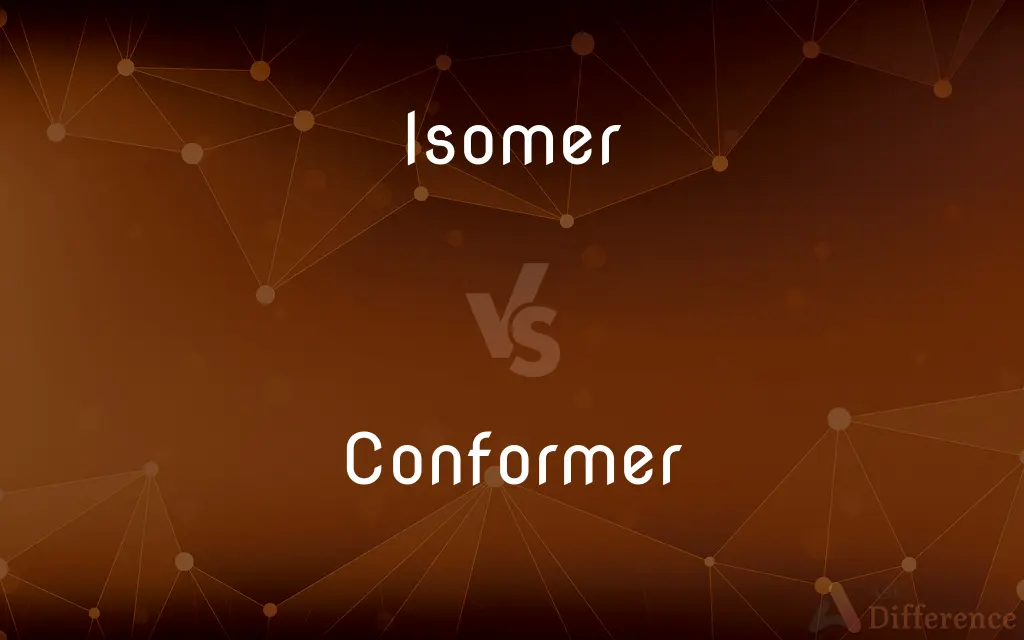Isomer vs. Conformer — What's the Difference?
By Urooj Arif & Maham Liaqat — Updated on April 5, 2024
Isomers are molecules with the same molecular formula but different arrangements of atoms in space, while conformers are specific types of isomers that differ only in the rotation around a single bond.

Difference Between Isomer and Conformer
Table of Contents
ADVERTISEMENT
Key Differences
Isomers represent a broad category in chemistry involving molecules that share the same molecular formula but have different structural arrangements, leading to distinct properties. There are several types of isomers, including structural (or constitutional) isomers, which have different connectivities of their atoms, and stereoisomers, which have the same connectivities but differ in the orientation of their atoms in space. Stereomers include enantiomers, diastereomers, and geometric (cis-trans) isomers, each reflecting a different type of spatial arrangement.
Conformers, also known as rotational isomers or conformational isomers, are a subset of stereoisomers. They specifically refer to molecules that differ from each other by the rotation around a single sigma (σ) bond. This distinction is crucial because conformers can interconvert through simple rotations about single bonds, a process that does not require breaking any bonds and typically occurs at room temperature. This easy interconversion means that conformers are often not isolable as separate entities under normal conditions, unlike other types of isomers.
The concept of isomers touches on the fundamental ways atoms can be arranged to form molecules, which in turn influences the molecule's physical and chemical properties. In contrast, conformers highlight the dynamic nature of molecules and how intramolecular movements can exist without altering the molecular framework. While the study of isomers provides insight into the variety and diversity of organic compounds, the study of conformers sheds light on the flexibility and adaptability of molecules, especially in biological systems where molecular shape significantly affects function.
Given their definition, all conformers are isomers, but not all isomers are conformers. The distinction between these concepts is significant in fields like organic chemistry, pharmaceuticals, and materials science, where the specific arrangement of atoms within a molecule can drastically impact its reactivity, functionality, and interaction with other molecules.
While isomerism encompasses a broad range of molecular diversity based on differences in atom connectivity or spatial arrangement, conformational isomerism specifically deals with the subtle variations in molecular shape that occur due to rotation around sigma bonds, offering a glimpse into the dynamic aspect of molecular structures.
ADVERTISEMENT
Comparison Chart
Definition
Molecules with the same molecular formula but different arrangements of atoms.
Molecules that differ only by rotation around a single bond.
Types
Structural isomers, stereoisomers (enantiomers, diastereomers, geometric isomers).
A subtype of stereoisomers, specifically due to bond rotation.
Interconvertibility
Generally cannot interconvert without breaking bonds.
Can easily interconvert through bond rotation.
Physical and Chemical Properties
Can vary significantly between isomers.
Generally similar, as they are the same molecule in different orientations.
Isolation
Many isomers can be isolated as distinct compounds.
Conformers are typically not isolable as separate entities under normal conditions.
Compare with Definitions
Isomer
Molecules with identical molecular formulas but different structures or spatial arrangements.
Butane and isobutane are isomers, having the same formula C4H10 but different structures.
Conformer
Not typically isolable due to easy interconversion at room temperature.
Conformers of butane interconvert too rapidly to be separated.
Isomer
A category in chemistry denoting molecules with the same atomic composition but different forms.
Cis-trans isomers have the same bonds but differ in their geometric positioning around double bonds.
Conformer
Molecules that are the same in terms of connectivity but differ in the rotation around a single bond.
Ethane conformers differ by the rotation around the carbon-carbon single bond.
Isomer
Reflects the diversity in the arrangement of atoms in organic chemistry.
Stereoisomers, such as enantiomers, are isomers that are mirror images of each other.
Conformer
The dynamic aspect of molecular structure in chemistry.
Conformers illustrate how molecular shapes can change without altering the molecular framework.
Isomer
The basis for the variety of organic compounds with different properties.
Isomers can exhibit vastly different boiling points, solubilities, and reactivities.
Conformer
Important in understanding the flexibility of molecular structures.
The study of conformers is crucial in biochemistry for understanding protein folding.
Isomer
Compounds that exhibit isomerism.
Glucose and fructose are isomers, differing in the arrangement of atoms.
Conformer
A specific type of stereoisomerism based on bond rotation.
The staggered and eclipsed forms of ethane are conformers.
Isomer
In chemistry, isomers are molecules or polyatomic ions with identical molecular formulas — that is, same number of atoms of each element — but distinct arrangements of atoms in space. Isomerism is existence or possibility of isomers.
Conformer
Conformer is a clear acrylic shell fitted after an enucleation if the final artificial eye is not available at the time of surgery to hold the shape of the eye socket and allow the eyelids to blink over the shell without rubbing the suture line. The conformer shell holds the shape ready for the artificial eye.
Isomer
(Chemistry) Any of two or more substances that have the same molecular formula but differ in the way their atoms are connected to each other, in the spatial orientation of their atoms, or, in the case of large molecules such as DNA, in their molecular topology.
Conformer
To be or act in accord with a set of standards, expectations, or specifications
A computer that conforms with the manufacturer's advertising claims.
Students learning to conform to school safety rules.
Isomer
(Physics) Any of two or more nuclei with the same mass number and atomic number that have different radioactive properties and can exist in any of several energy states for a measurable period of time.
Conformer
To act, often unquestioningly, in accordance with traditional customs or prevailing standards
"Our table manners ... change from time to time, but the changes are not reasoned out.
We merely notice and conform" (Mark Twain).
Isomer
(chemistry) Any of two or more compounds with the same molecular formula but with different structure.
Conformer
To be similar in form or pattern
A windy road that conforms to the coastline.
A shirt that conforms to different body shapes.
Isomer
(physics) Any of two or more atomic nuclei with the same mass number and atomic number but with different radioactive properties. Category:en:Radioactivity
Conformer
To bring into accord or agreement; cause to correspond or comply
"a woman who has conformed herself to the male-designed image of virtuous widowhood so that she can live in peace" (Jennifer Panek).
Isomer
A compound which is isomeric with another body or compound; a compound having the same chemical composition as another compound; a member of an isomeric series.
Conformer
(chemistry) Any of a set of stereoisomers characterised by a conformation that corresponds to a distinct potential energy minimum.
Isomer
A compound that exists in forms having different arrangements of atoms but the same molecular weight
Conformer
(biochemistry) A particular folded state or conformation of a protein, especially an abnormal conformation of a prion
Conformer
A person who conforms; a conformist.
Conformer
(religion) A Conformist.
Conformer
One who conforms; one who complies with established forms or doctrines.
Common Curiosities
What role do conformers play in biological systems?
Conformers are vital in biological systems because the flexibility they demonstrate is crucial for the function of biomolecules, such as enzymes and receptors, whose activity depends on their ability to adopt different shapes.
Why are enantiomers considered isomers but not conformers?
Enantiomers are considered isomers because they are non-superimposable mirror images with the same connectivity but different spatial arrangements that cannot interconvert without breaking bonds. Conformers, however, can easily interconvert through rotations around sigma bonds.
How do isomers affect the properties of a substance?
Isomers can have drastically different physical and chemical properties because the arrangement of atoms affects the molecule's shape, reactivity, and interactions with other molecules.
How do chemists study conformers?
Chemists study conformers using various spectroscopic techniques (like NMR spectroscopy) that can capture information about molecular shapes and the energy differences between different conformations.
How does the concept of isomerism impact drug design?
In drug design, isomerism is crucial because different isomers of a drug can have different biological activities, efficacies, or side effects. Understanding and controlling isomerism allows for the development of more effective and safer drugs.
What is the significance of geometric (cis-trans) isomers?
Geometric (cis-trans) isomers are significant because they exhibit different physical and chemical properties due to their different spatial arrangements, affecting their reactivity and interactions with other molecules.
Are all stereoisomers also isomers?
Yes, all stereoisomers are a type of isomer. Stereoisomers have the same molecular formula and sequence of bonded atoms (constitution), but they differ in the three-dimensional orientations of their atoms in space.
Can conformers of a molecule exist in different conditions?
Yes, conformers can exist in different proportions depending on temperature, solvent, and other conditions, as these factors can influence the energy landscape and thus the relative stability of different conformers.
Why can't conformers usually be isolated as distinct compounds?
Because conformers can interconvert through simple rotations around sigma bonds, often requiring very little energy, they exist in a dynamic equilibrium that does not allow for easy separation.
Can a molecule have both isomers and conformers?
Yes, a molecule can have both isomers and conformers. For example, a molecule might have structural isomers with different connectivities and also display conformational isomerism within each structural isomer.
Share Your Discovery

Previous Comparison
Crush vs. Crash
Next Comparison
Plaintiff vs. RespondentAuthor Spotlight
Written by
Urooj ArifUrooj is a skilled content writer at Ask Difference, known for her exceptional ability to simplify complex topics into engaging and informative content. With a passion for research and a flair for clear, concise writing, she consistently delivers articles that resonate with our diverse audience.
Co-written by
Maham Liaqat













































